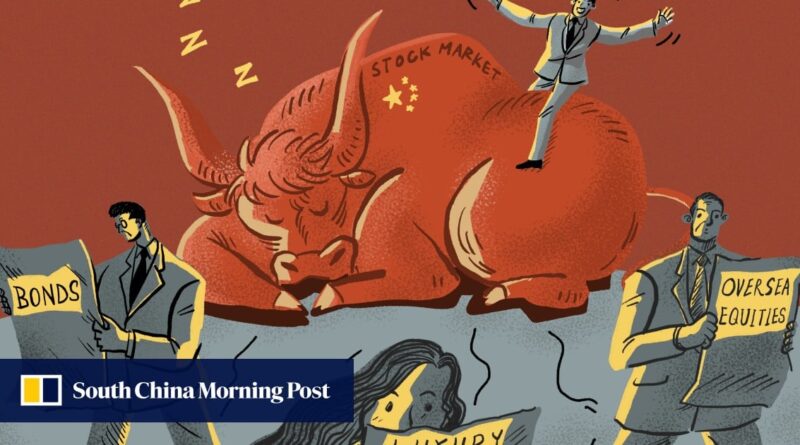Why 220 million Chinese investors are avoiding the stock market
This is a setback for Wu Qing, chairman of the China Securities Regulatory Commission (CSRC), who has launched a series of initiatives since taking office in February, from a pledge to raise the value of listed companies to the risk of short selling. After a temporary setback due to such government support, investors are fleeing amid concerns about the prospects for economic growth and corporate earnings.
“China’s markets are always very stressful for investors,” said Gary Dugan, CEO of The Global CIO Office in Dubai, which provides services to family offices, wealth managers and high net worth individuals. “Investors are looking for visible and big steps from the government. The market needs policies that [can] provide a boost to near-term growth. If an effective impact can be brought to the economy, the upside in the market can be huge. ”
Instead, China’s central bank cut its policy interest rate and long-term lending rate after two meetings, which dampened commodity prices and sent the airline into recession.
“While the Politburo announcement acknowledged the recession and promised measures to address the deficit, there were no new policies,” said Ronald Temple, chief market strategist at Lazard. Asset Management. “The Politburo has emphasized the need to address the housing crisis, but has not proposed new measures to absorb the oversupply of housing or to encourage consumption in the wider economy.”
Temple said he was retracting the call he made earlier this year about China’s recession, adding that “China is likely to drag global growth again in 2024 and 2025”.
The CSI 300 Index is now about 10 percent off its high for the year as of May 20, and the combined daily trading values of the Shanghai and Shenzhen exchanges fell to a million yuan 472.9 thousand (US $ 66.1 billion) last week. It was the lowest since May 2020 and significantly smaller than the daily average of 589 billion yuan this month and 790 billion yuan this year.
Even some extreme measures taken by the CSRC have failed to restore confidence. Last month, the watchdog suspended the business of state-backed China Securities Finance, which lends to short-term traders. That nearly dampened short-selling, dropping to the lowest price in four years as short-sellers were quick to offload the trade in order to depreciate.
China’s mysterious reshuffling of top finance officials and the ongoing purge of the defense industry have also put investors at a disadvantage, leaving them guessing about policy plans.
In fact, some optimists argue that the downside risk is reduced and stocks are attractive compared to bonds, which receive lower yields.
“In terms of valuations, Hong Kong-China stocks are currently trading at the low end of their history, which could represent good entry points for long-term investors,” said William Fong, head of Hong Kong China fees at Baring Asset Management. Hong Kong. “As the economy gradually normalizes, we are finding opportunities for high-quality low-cost growth.”
He said that stocks related to construction, health care and technology can perform better as they benefit from the country’s strategies to pursue sustainable growth, technological innovation and environmental awareness.
UBS group strategist Meng Lei said China’s insurance companies, sitting on total assets of more than 30 billion yuan, will gradually shift to stocks, as industry investment set to be pressured by the rapid decline in bond yields. China’s 10-year government bond yield fell as low as 2.124 percent on August 2.
“Funds from insurance companies [to stocks] it will not happen overnight,” said Meng. “They will gradually increase the levels according to the fundamental changes and the recovery of wages.”
The CSI 300 Index is currently valued at 11.6 times estimated earnings for this year, compared to multiples of 23.2 times for the S&P 500 Index and 21.2 times for the Nikkei 225, according to Bloomberg data.
However, investors remain vigilant against falling into the so-called value trap – cheap stocks offset by low corporate earnings.
Currently, investors are stuck in asset classes other than stocks. Some are betting on an extension of the record-breaking rally in the bond market, as the central bank repeatedly warns of the potential risk of low yields that could lead to huge investment losses when growth can go up. They argue that a downward trend in producer prices will lead to lower interest rates to boost demand for credit products. Chinese factory gate prices fell for the 22nd month in July, while consumer prices remained below 1% for the 17th month in a row.
The Nikkei 225-linked ETF managed by China Asset Management has at one point traded a record 21% off its asset value this year, while the premium on the firm’s ETF tracking the S&P 500 Index touched a the highest. of 18 percent, according to Bloomberg data, highlighting strong demand in the secondary market.
In addition to these options, wealthy Chinese investors have turned their eyes to another part of the country’s depressed property market, packing money into luxury homes in major cities in hopes that tight supply will protect them. their wealth.
“If you really want to find a safe haven for the capital now, luxury homes in big cities like Shanghai should be the best choice,” said Yan Yuejin, vice president. of E-house China Real Estate Research and Development Institute in Shanghai. “No matter how high house prices continue to rise, these high-quality properties are rare and can satisfy the need to save and increase wealth.”
For now, overseas investors have taken a back seat as signs of a sell-off remain tight.
“Nobody owns China and Hong Kong [stocks] on their radar now,” said Brook McConnell, president of Southern Ocean Management.
“There is a slow improvement, not enough to make anyone happy. The patient is still in bed. The market needs more from Beijing.”
#million #Chinese #investors #avoiding #stock #market
